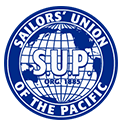Labor Day is more than just a season marker or a shopping holiday, Labor Day is a national tribute to the contributions and sacrifices of American workers. Its origins lie in a period of great hardship and determination, when laborers across the country began to organize for better conditions and recognition. In other news, Matson's first of three new Aloha Class ships begin work, California Govenor's race, and redistricting heats up.
On July 5, 1934, the streets of San Francisco erupted in violence as police and striking longshoremen clashed in one of the most pivotal labor struggles in American history. Known thereafter as Bloody Thursday," the day became a grim but galvanizing moment in the fight for union recognition and workers' rights on the West Coast.
On June 6, 1944, Allied forces launched Operation Overlord, the largest amphibious invasion in history, storming the beaches of Normandy to begin the liberation of Western Europe from Nazi occupation. While the day is often remembered for the heroism of soldiers who landed on the shores under fire, a vital yet often overlooked role was played by the U.S. Merchant Marine. In other news, Panama, home to the World's largest ship registry, is facing mounting international scrutiny after accusations emerged that its open registry system has been exploited to help Iran evade sanctions.
In a significant development for global trade, the United States and China have agreed to a temporary pause on new tariffs, providing a much-needed breather for the international shipping industry. USCG issues new rules to streamline and modernize U.S. reflagging process. Maritime Trades Department Executive Board meets on May 7th and issues range of policy statements.
Trump announces comprehensive plan to revitalize the U.S. Shipbuilding Industry. Proposes large fees for China built ships calling U.S. ports. A few days later CMA CGM CEO Rodolphe Saade announces plan to invest twenty billion dollars in the United States over the next four years. This would include American built ships and increasing APL U.S. Flag ships from ten to thirty. In a last minute deal, the Senate passed a stopgap bill to prevent a government shutdown, ensuring temporary funding for federal agencies.
SUP members turned out in force to cast their votes in the Union's triennial election. The Balloting Committee confirmed the certified results: former Vice-President Matt Henning was elected President and Sam Worth was elected Vice-President. The proposed dues increase failed. Meanwhile hostage mariners in the Galaxy Leader were released and observers struggled to understand various Trump administration policies on tariff whiplash, the dismantling of US AID, federal worker terminations, among many more.
Major new maritime legislation was introduced in Congress by a bi-partisan group of Senators and Representatives in December. Increasing funding and extending the life of the Maritime Security Program and Tanker Security Program, it calls for a new wave of U.S. shipbuilding, among many other things. The European Union, meanwhile, tried to punch a hole in the Jones Act by lobbying for special access to the U.S. domestic coastwise trade.
The triennial SUP election to elect officers and decide a constitutional question began on December 1st. Urging all members to vote, this edition also points the way on balloting procedure and timeline. Maritime labor took a firm stand against sub-standard ships in U.S. ports and noted a strong initial funding line emerging from Congress for the Maritime Security Program. Despite new and old threats to Union labor, merchant mariners, and the nation itself - SUP sailors as champions of the holiday season supply chain are celebrated in these pages.
Donald Trump won the U.S. presidential election, shaking the American political landscape, pointing to broad changes supported by new Republican Congress with majorities in the House and Senate. The U.S. Army's hesitation on support for sealift was compounded by deep deficiencies of its own maritime assets, said a government watchdog. And as the service of American veterans including merchant mariners was honored on Veteran's Day, the SUP's own election was set to begin and gets extensive reporting in the Election Supplement of this issue.


